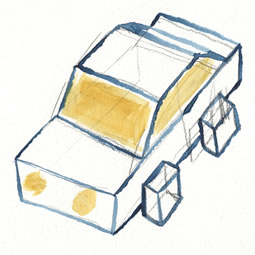Poet Peg Boyers has always had a fascination with Italian author Natalia Ginzburg. While attending Skidmore college, Boyers studied Italian and read all of Ginzburg’s essays, plays, and fiction. Over the course of four years, a book of poems developed in which Boyers, speaking through the imagined voice of Ginzburg, describes life in Turin, marriage to resistance activist Leone Ginzburg, Ginzburg’s role as Ernest Hemingway’s editor, and her work as a novelist, playwright, and newspaper columnist in a time of war and fascism. The book, Hard Bread , published in 2002, was Boyers’s first book of poetry. It was born, Boyers writes below, in the passenger seat of her Honda Accord, of all places. In this latest installment of Writers’ Rooms, Boyers delves into the space and environment from which these poems and others came to life. “Ginzburg wrote everything but poems—and I wrote the poems for her.” Boyers’s second book, Honey with Tobacco, will appear in April 2007 and we feature some excerpts in our poetry section.

My first poems were written in the car on my first laptop. It was autumn and our youngest son was away at boarding school, and we were premature empty-nesters speeding off to visit him every weekend. My son’s leaving home at fifteen was a change in our lives of seismic proportions, and I felt it profoundly in my body and in my mind. I had never aspired to being a poet, but when the various continental shifts in my physical and emotional make-up settled, poems started to manifest themselves. I began taking them down. They were not poems about the experience of having our son living away. They were not poems of loss or grief or of what I suppose some women feel in this position—relief, liberation. They were about my own childhood, a subject which, as I soon learned from the painfully bad poems that came out, I was ill-equipped to address. Nevertheless I persisted, writing lines, making lists of impressions and pressing memories I had to tame. To my astonishment I found that the themes which ran through my concerns were the familiar themes of Literature. But the poems which attempted to make something of these themes were weighed down by the embarrassing banality of My Life.
I needed to find a way to translate that banality into something that first of all wouldn’t bore me to death and which wouldn’t result in poems of asphyxiating tedium. Having grown up with three languages, I have always found translation a handy way of getting at the problem of the limitations of language. Say something in English and it means one thing, in Italian another; in Spanish with a Cuban inflection, still something quite distinct from those first two meanings. I had been reading Natalia Ginzburg’s work for at least twenty years at that time and so using her life and work to address my “issues” came as a natural solution. Why not use her relationship to her father and siblings to explore the troubling thoughts I was having about the effects of disobedience and the necessity of lies in a family? Why not explore my own crisis of faith through what I imagined might have been hers? Why not explore the terror felt throughout my pregnancy of having a disabled child by imagining Ginzburg’s relationship with her own damaged daughter? And so it was that I apprenticed myself to the writer Natalia Ginzburg who had died in 1991 and proceeded to write her poems for her. It was her spaces, her Italian light, and her seasons that allowed me to find my voice. It was in her life and its circumstances that I found inspiration. I made them mine and within those appropriated spaces and under those stolen Italian skies, I wrote my first book, Hard Bread.
In my own life I was spending about four hours every Saturday morning sitting next to my husband in our Honda, driving across Vermont to New Hampshire to see our son, banging away at my laptop all the way, and then turning around on Sunday and writing all the way home. Something about being enclosed in a private place, barely aware of the continuously changing landscape out the window, something about those luxurious four-hour blocks of undisturbed writing time, made it the ideal space for my imaginary excursion through another person’s life, allowing me to write some thirty poems over the course of two years. It’s as if the clarity and stability of the process taking place in my mind and on the page were made possible by the blur passing me by outside the speeding vehicle. I don’t think what was going on outside was irrelevant at all, but rather that it provided a usefully inert medium in which my poems could breath and grow unencumbered.
It’s been about four years now since the publication of Hard Bread. In the meantime I have had to face those early poems. I have managed to bring some of them to life; others died a quiet death in the process and the world is no sadder for the loss of them. Our youngest son is twenty-five, and his turbulent movement through adolescence and early manhood has continued to provide rich inspiration for me in life and in poetry. By what light and space do I work now? My study until recently has been shaded by an enormous mulberry tree so thick with branches that in winter the shade barely subsided. This fall the branches weighed so hard on my study’s roof that the corner eaves snapped off. Our neighbor has kindly had the tree cut down and a brilliant eastern light now glares through my mornings. I am not accustomed to such illumination. My current challenge is to learn to navigate this bright terrain.
